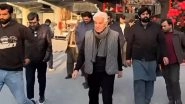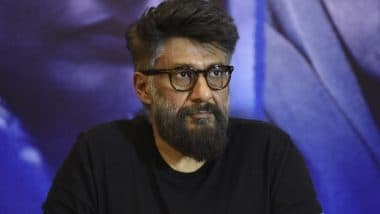Filmmaker Vivek Ranjan Agnihotri spoke about the ongoing crisis surrounding the alleged rape and murder of a trainee doctor at Kolkata's RG Kar Medical College and Hospital. Agnihotri, who has been vocal about the incident and its broader implications, arrived in West Bengal to join the protest, share his thoughts on the situation and call for substantial reforms. Kolkata Doctor Rape-Murder Case: Sourav Ganguly Puts Black Display Picture on His Social Media Accounts in Support of Victim.
Agnihotri, known for his critical stance on various social and political issues, expressed his strong emotions about the case during a press conference. "I was here yesterday, and suddenly, when I saw the Supreme Court's order for Tuesday, many students were saying that when the Nirbhaya case happened in Delhi, people from all over the country went there. But why is it that in Kolkata, no one is coming here? I felt very strongly that I should come. Yesterday, we walked and protested for emotional reasons," Agnihotri stated.
Vivek Agnihotri Speaks Out Against Bengal's Political System
#WATCH | Kolkata, West Bengal: On Kolkata's RG Kar Medical College and Hospital rape-murder incident
Film director Vivek Agnihotri
— Elon Musk (@Youth_Ki_Aavaj) August 21, 2024
The filmmaker, who is currently researching Bengal for his upcoming project Delhi Files, drew a poignant connection between the historical significance of the region and the current state of affairs. He remarked, "There is also a background to my connection with this. I have been researching Bengal for the past 4-5 years for my upcoming film Delhi Files. I have seen that the liberty and freedom women have were written into the land of Bengal."
Agnihotri underscored Bengal's historical role as a crucible of revolutionary ideas and social progress, citing the region's contributions to spiritualism, journalism, and women's empowerment. "This is the land where Tagore wrote, 'Where the head is held high and the mind is free.' This is the land where Sarath Babu wrote about women's liberty in literature. This is the land where, during British rule, Bina Das fired bullets at the governor in a university," he said.
Despite this illustrious history, Agnihotri expressed dismay over the current state of affairs, criticizing the political and law enforcement systems in West Bengal.
"We are all sitting in Kolkata, but I have travelled a lot. From my experience, I can say without shame or fear that all criminal activities, including sexual exploitation and violence against women, are operated from the offices of these political parties in districts and villages. Sexual violence demoralizes society and families, and consolidating this into vote banks is considered the smoothest and safest method here," he said.
"In other states, electoral violence and sexual violence for political reasons have stopped, but it still continues in Bengal. I feel now is the time for change. My only demand is that the entire system of Bengal's politics should change, and a social-political and women empowerment revolution should start from here," Agnihotri added. The filmmaker highlighted that the youth of Bengal needs to wake up and change the ongoing scenario.
"On this barren land, thousands and millions of new seeds should be sown by young people, leading to new thinking and new politics. The old communist and current politics should end here. Industrialists, artists, and those who have left Bengal should return. We need to come here and make films," Agnihotri said.
Speaking to ANI, Vivek Ranjan Agnihotri said, "The law and order situation was already in a bad state, and now I feel it has completely collapsed. Otherwise, why would the Chief Minister protest against herself? Some say she was protesting against the CBI. But who does the CBI fall under? Isn't it part of this country? Do we need a separate passport for Bengal?"
"Yesterday, they didn't even allow us to protest. I had to get permission from the High Court to hold the protest," he said in a conversation with ANI.
The filmmaker also drew parallels between the political environment in Bengal and other regions of India, suggesting that the state's unique issues are deeply intertwined with its political landscape.
Agnihotri also emphasized his concerns about the broader implications of the situation, stating, "I cannot shoot in Kashmir or Bengal; I don't feel safe here. I don't want to go into details, but I had sent a legal notice last year. When the CM called my film a lie and propaganda and banned it, I sent her a legal notice."
"But ask anyone, and they will say that they don't feel safe here in India. If they felt safe, they would invest here, buy homes, and industrialists would come. But people don't have the right to life here; they don't feel safe because the underworld controls the politics of this place," he added.
"My only message to everyone is that this is the time to make Bengal great again," Vivek Agnihotri said during the interview. Earlier, on August 21, Vivek Ranjan Agnihotri joined the protest rally against the alleged rape and murder of a trainee doctor at Kolkata's RG Kar Medical College and Hospital and expressed his outrage.
Speaking to ANI, Vivek Agnihotri shared his feelings on the incident. He said, "My demand is just this that since the time of the Direct Action Day, rape has been used as a political weapon. In Bengal, communal, political, and electoral violence should end. And we have to make Bengal great again. And that is possible only if the current political system is completely changed. This government has completely failed. I have come here because many young people are asking me. I want them to get inspired that yes, if I can stand here and protest, they can too. We have to make Bengal great again if we want India to succeed." Kolkata Doctor Rape-Murder Case: Ram Charan’s Wife Upasana Kamineni and Other Female Leaders of Apollo Hospitals Demand Justice (Watch Video).
On August 9, a postgraduate trainee doctor was allegedly raped and murdered on duty at RG Kar Medical College in Kolkata, which has led to nationwide strikes and civil societies and doctors across States protested against the incident and demanded severe punishment to the accused persons and sought safety and security for themselves.













 Quickly
Quickly


